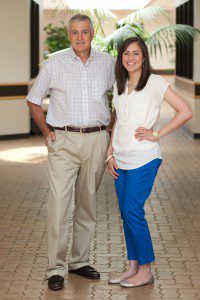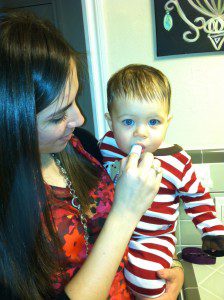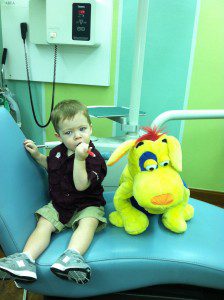As a pediatric dentist and fairly new aunt to my precious 21 month-old nephew Luke and 2 month-old niece Emma, I have been learning a lot about frequently asked questions concerning dental care for your baby. One of the first questions my sister asked me while she was on her way to a play group with my nephew is when is a good time for Luke to start going to the dentist? All of her mom friends from the play group had heard differing opinions. So for the first of a few blog posts related to dental care, I want to try to answer that question and explain the importance of establishing a dental home early for your child.
According to the American Academy of Pediatric Dentistry, the first dental visit is recommended at the time of eruption of the first tooth and no later than 1 year of age. This early establishment with a pediatric dentist allows for a few things including: giving your child the opportunity to adjust to new surroundings so they feel comfortable and at ease in the dental office, monitoring of development and eruption of your child’s teeth and starting good oral health habits to name a few. Did you know that taking care of your child’s dental health actually begins even before they are born? It is very important for moms to take care of their own dental health while pregnant because bacteria in our mouth can spread to our babies. The quality of dental health can thus influence the overall health of our body and our child’s. Significant dental disease in mothers has even been correlated to incidences of low birth weight babies.
You should also begin brushing your child’s teeth as soon as they start to come in. You can use a child size (small), soft bristle toothbrush or finger toothbrush with water or training (fluoride free) toothpaste. It is recommended to brush in the morning and at night before your child goes to sleep. It is very important that your child should not go to bed with a bottle unless it has only water in it. If the teeth are coated by milk as the child sleeps, early childhood caries or cavities (“baby bottle” decay) can develop.
What can you expect at your child’s first visit to a pediatric dentist? The first visit consists mostly of individualized counseling and discussion regarding topics such as oral hygiene, oral habits (thumb-sucking/pacifiers), dental development, diet, injury prevention and more. We will assess the following things by a clinical exam performed by the doctor:
- child’s overall health/growth
- soft tissue health (for example the gingiva (gum tissue), lips, tongue)
- developing teeth
- oral habits and hygiene
This will also be a time for you to ask questions. We hope to make the first visit fun and exciting for your child as well as informative for you. Our goal is to create a lifetime of healthy smiles for you and your child!
 Dr. Dan Doss grew up in Kemp, Texas before making the move to Fort Worth to attend TCU. He attended dental school and a two-year residency in the specialty of Pediatric Dentistry at the University of Texas School of Dentistry in Houston. He has been married to Maureen (Mo) for 33 years and has two grown children, Michael and Kaydee and daughter in law Megan. He is excited to welcome his first granddaughter in March 2014. He enjoys reading, playing golf and spending time with family and friends.
Dr. Dan Doss grew up in Kemp, Texas before making the move to Fort Worth to attend TCU. He attended dental school and a two-year residency in the specialty of Pediatric Dentistry at the University of Texas School of Dentistry in Houston. He has been married to Maureen (Mo) for 33 years and has two grown children, Michael and Kaydee and daughter in law Megan. He is excited to welcome his first granddaughter in March 2014. He enjoys reading, playing golf and spending time with family and friends.
Dr. Liz Gold grew up in Palestine, TX. She attended Texas A&M University where she graduated in 2006 and proceeded to continue her education at the University of Texas School of Dentistry in Houston where she completed both dental school and residency. She has 4 siblings and 3 in-laws and has recently become an aunt to Luke (22 months) and Emma (3 months). In her free time she enjoys traveling, running, Aggie football games and spending time with family and friends.
Dr. Doss and Dr. Gold practice at Legacy Pediatric & Adolescent Dentistry in Southwest Fort Worth. They are both Diplomates of the American Board of Pediatric Dentistry and members of the American Academy of Pediatric Dentistry as well as local, state and national dental societies.















